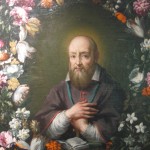Bishop St. Francis de Sales, although an episcopal ancestor by more than 400 years, seems to have spiritual synchronicity with episcopal teachings today.
 The USCCB’s published reflections for the Fortnight for Freedom for the Third Day, today, June 23, are as follows:
The USCCB’s published reflections for the Fortnight for Freedom for the Third Day, today, June 23, are as follows:
“God is the author of all truth and all good. All of what is true and good in our world and cosmos finds its source in God, the Creator of all. Moreover, what is true and good about ourselves as human beings finds its source in God in that he created us in his image and likeness. Thus, for the Council Fathers, all that exists is in conformity with the divine law, the providential plan of God.
Because of this, the Council emphasizes that truth must be “sought after in a manner proper to the dignity of the human person and his social nature.” This means that human beings must be free to seek the truth. However, human beings do not seek the truth as isolated individuals. The search for the truth is common to all, and so all share in the finding of truth and all share in the receiving of truth from others. Because the search for truth, the finding of truth, and the sharing of truth is a social exercise, human beings must not only be free to search for truth in the hope of finding it, they must also be free to communicate and discuss together the truth they believe they have found. It is through our free assent that we each personally lay hold of the truth.” (Reflections for the Fortnight for Freedom, Day 3)
 Author Fr. Eunan McDonnell, in his analysis of St. Francis de Sales, points out a similar approach in the Bishop’s perspective.
Author Fr. Eunan McDonnell, in his analysis of St. Francis de Sales, points out a similar approach in the Bishop’s perspective.
“The uniqueness of the Salesian understanding of freedom values the relational aspect of our image and likeness of God. Is it not true that freeedom is often perceived as an individual right? But, from a Salesian perspective, does it not follow that such a Trinitarian reading of the Imago Dei moves us more in the direction of the social or communitarian nature of freedom?
“A correct reading of St. Francis de Sales’ understanding of the Trinity would appear to emphasize the communitarian dimension. This would have obvious consequences for freedom. In this perspective freedom is no longer simply my freedom. Just as God is relational, so too, when I share the gift of my freedom with others, I do not lose the gift of my individual freedom, but on the contrary, it finds its fullest expression.
“We can elicit two important elements that contribute to a Salesian understanding of freedom:
“The injunction given by God to have dominion over creation.
“We are created to love God as his image and likeness.”1
REFLECTION:
What similarities can you draw from the two excerpts above, the one from the USCCB and the other from Fr. McDonnell’s reflection on St. Francis de Sales?
1. The Concept of Freedom in the Writings of St. Francis de Sales, page 103, 104
See also Reflections for the Fortnight for Freedom (links to documents for all 14 days)